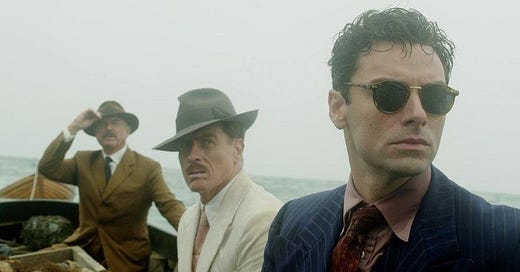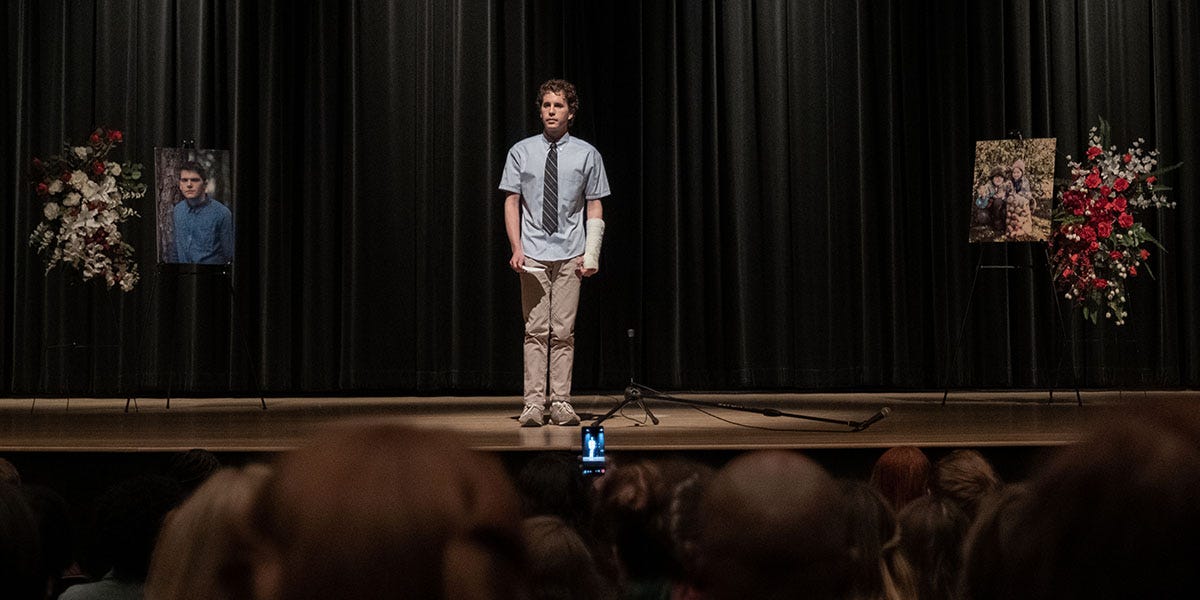WELL HEY THERE BEAUTIFULS! It’s fall now — longer than our hiatus was meant to be, but we decided to just go big and live life to the fullest. And truly, things have been bustling in Summer 2021. We finally saw each other again after far too long apart, we went to the theater, “went” to TIFF, and continued to generally ooze film opinions. But now we’re stoked to be back in your inboxes to yell about movies and share our opinions on the highs and lows of our film habits as of late. This week: some lows, lol.
First up, Zosha on finally picking up a book and learning the twist of And Then There Were None. Then we’ve got Cate on Dear Evan Hansen, and its refusal to really get as nasty as it needs to.
Zosha on And Then There Were None
At least once every one of us has picked up some classic literature and found that, hey, this thing might just have some legs after all. Mine — or, at least, my latest, as of this time of writing — is And Then There Were None. I found the book in a Little Free Library (bless up) and realized that somehow, despite being a cornerstone of the mystery genre and the blueprint for any number of my favorite things, not least of which are bottle episodes, I had never had the ending spoiled for me. I resolved to read it before I did. So with the clock on, a tight three months and 21 days later and I finally finished, elated to find out that, hey, this Agatha Christie chick knows how to write a good book, huh? From there I did what any TV and film critic would do: I turned my eye towards adaptations.
And reader, hoo boy was I disappointed by the 2015 BBC mini-series adaptation of And Then There Were None. Where Christie’s book hums along with a knowing sensibility, always smart and considerate about the true motivations of its players, the BBC series is just as shiny and shallow as a mirror, sleekly mimicking but never capturing the grace of the novel.
The mini-series is, clearly, made in a time of Prestige Television™️, where the color palette is blanched and motivations must be nefarious. But (and I’ll try to curb my language here so as not to spoil anyone like Summer 2021 Zosha who hasn’t yet partaken) part of the beauty of Christie’s novel is its ambiguity: characters’ actions or motivations are not fully explained, giving them a haunting quality that linger with you and justify themselves in the gray of it all. It’s suggested that everyone on the island was brought there because they killed someone in a way the law couldn’t punish, but Christie needles at that very concept by not confirming many of the incidents at all. Is a general who sent a soldier to die on the battlefield the same as a neglectful caretaker? A judge who brought down a death sentence the same as murder? If one of these is definitely a murder, are they all?
BBC took no such risks with enigma. Almost immediately we see how each of these members are conniving and cruel in their own ways (and often more explicitly at fault than their literary counterparts). What they forget amid all their carefully toned flashbacks is that within the ambivalence is possibility; dimension. Where BBC sees the opportunity for complicated anti-heroes it neglects the idea at the core of And Then There Were None: That maybe this vigilante justice isn’t justified at all.
The mini-series spared no expense at building out their Soldier Island, with lush greens and ominous cliffs magnificently framing the stately mansion. That the house feels sometimes like a set — too clean, at times too sparse or filled, and not homely at all — only plays into the sense of foreboding sewn through the series. Soldier Island isn’t meant to be a home, after all; its polished nature is supposed to be a blank trap to ensnare its victims. Its marble surfaces and opulent size are there to rib British class sensibilities, like how the butler will be “late” with breakfast after his wife the maid dies, or how no one is eager to turn on each other. These aren’t choices Christie made in a vacuum; they directly inform how the characters conduct themselves and unknowingly fuel both their own madness and demise. By playacting at regular life, they play right into the artifice that drew them there.
I know I’m coming across as a “book is always better” person, and true friends of the newsletter will tell you that is not what I believe at all. But in this case, I’d advise skipping a glossy but hollow adaptation of one of the greatest mysteries of all time and heading instead for one of the older films (my next stop), or even (hey!) the novel itself.
Cate on Dear Evan Hansen
There are lots of reviews that will tell you what you’ve likely already heard about Dear Evan Hansen — that it’s bad, bordering on sociopathic, and its star is too old to play a teenager. But after viewing the 2021 film adaptation of the Tony-winning musical, I’m genuinely still on the fence about its quality as a work of art.
I was never lucky enough to see Dear Evan Hansen on the stage, but the Broadway Cast Recording is one of the many things I used to self-soothe during the early months of the pandemic. As a result, I was intimately familiar with the many contours of the show’s music before I sat down for the movie. The film is a fairly faithful leap from stage to screen, but it’s the differences between them that make the movie’s flaws so pronounced.
Dear Evan Hansen is about a socially isolated teenager named Evan (Ben Platt) who finds himself caught in a web of lies of his own making. A fellow student — Connor Murphy (Colton Ryan) — dies by suicide, while in possession of a letter he stole that Evan had written to himself as a therapeutic exercise. Faced with Connor’s grieving family, and the tortuous misunderstanding that his letter is in fact Connor’s suicide note, Evan weaves a tale so elaborate that he manages to create the life he’s always wanted for himself. He tells the Murphys that he and Connor were secretly best friends, weaving stories about their adventures together, and giving his family, including Zoe (Kaitlyn Dever) — Connor’s sister and Evan’s crush — hope that his life was not as painful as they had feared. Evan insinuates himself into Connor’s family, becoming a surrogate son to Connor’s parents and Zoe’s boyfriend as they deal with their loss. In doing so, he seemingly fills the hole left by the departure of his own father, and the frequent absences of his mother. The lie leads to internet fame and popularity for Evan, which draws him deeper into his fiction, and away from his own depression.
You’d be forgiven for thinking that this sounds like the story of a sociopathic teen who cons a grieving family. And truthfully, it’s not, not that. But as the changes the movie makes to the story hammer home even harder, Dear Evan Hansen wants to be a story about the difficulty teens face in their lives and the need for kindness and connection. In fact, the musical’s opening number is stripped from the film, for the explicit purpose of making sure that the audience remains in Evan’s perspective, and can more easily empathize with his pain. The major problem is that Evan’s actions are so deeply awful and upsetting that it’s quite difficult to find empathy for him. Many, many, many people are depressed. Very few of them use the family of a recently deceased acquaintance as their emotional support stand-ins.
But the substance of the story isn’t at issue here. Instead, what interests me is what the movie chose to alter and excise. Four songs are missing from the story’s original Broadway version, three of them from the perspective of the adults in the story — namely, Evan and Connor’s parents. The musical is not sung-through, and the film chooses to additionally narrate through the story beats pinpointed in “To Break In A Glove” and importantly, “Good For You.” The effect is that the characters who would have sung those songs — Danny Pino’s Larry Mora (Connor’s stepfather) and Julianne Moore’s Heidi Hansen (Evan’s mother) — are left feeling like ciphers who are unmoored from the story’s central tension.
Pino is left with very little to do musically with the exception of an aside in “Requiem.” The lyrics of the missing song highlight one of the story’s central ideas — that Evan is taking shortcuts to the meaningful relationships that he wants, when instead, he should be devoting the time and patience needed to build them organically. In the musical, it is a great character-building song that shows Mr. Murphy’s latent grief at the life he’d wished for his son and the lessons he wished he could have taught him. Without it, Mora feels dismissive of his wife’s all-consuming grief, as though he’s holding it at a distance so that it doesn’t infect him.
A similar thing happens with Evan’s mother Heidi. Moore is in the movie very little, as her character’s single-mother status is used to explain both her absences (she’s working to support them) and Evan’s apparent resentment of her and yearning for inclusion in the Murphy household. But in the song “Good For You” she directly confronts this tension, singing Well I’m sorry you had it rough/ And I’m sorry I’m not enough/ Thank God they rescued you. In the film, this beat is papered over with a cruel remark from Evan, and a muted response from Heidi. It inadvertently serves to make Evan look even worse because there’s no clear indication of precisely what it is he thinks he’s trying to escape.
The film also changes the story’s ending, building in a redemption arc that doesn’t appear in the musical. It’s a feeble attempt to forestall the criticism that ended up overwhelming the film’s premiere anyway.
Overall, the film has its moments, and it’s buoyed by the excellent music and Platt’s fully embodied performance. But in the end, it cannot surmount the problems of the source material or make up for the distractingly uncanny valley appearance of its star. The movie is overlong, overserious, and frankly, suffers immensely for never letting itself acknowledge the nastiness at its root.
Assorted Internet Detritus
ZOSHA: A surprisingly refreshing profile on the King Jared Harris. The Chair as peak jeans in church and the aesthetics of prestige. What happens to recycled bowling balls!! What restorative justice actually looks like. Two absolutely stunning essays on grief and loss that feel like there was a before and after I read them this summer.
CATE: No one goes on The Bachelor for the “right reasons” anymore, if you want to tax the rich, a dress won’t get it done, Ted Lasso deepens the black therapist trope, the unwritten rules of Black TV, what doesn’t work for me in American Crime Story’s Impeachment, and more thoughts on Dear Evan Hansen for Pop Culture Happy Hour.
It’s been a while, but you know the drill. If you’re just finding this newsletter, do us a favour and subscribe. It feeds our fragile egos. And if you’re already a loyal reader, help us out and tell a friend. Happy #movieyelling!
Zosha + Cate <3
twitter:@30FlirtyFilm
instagram:@30FlirtyFilm









